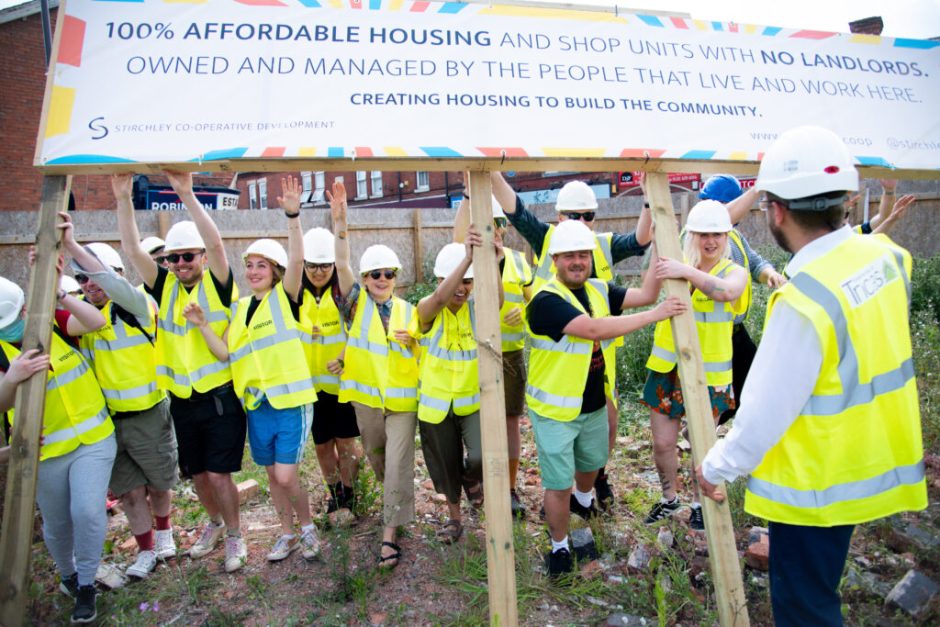With a new Social Housing Regulation Act gaining royal assent in July, housing co-ops had a lot to discuss at their annual conference, organised by the Confederation of Co-operative Housing (CCH) on 13-14 October in Kenilworth.
During one of the plenary sessions, Jonathan Walters, deputy chief executive at the Regulator of Social Housing, explained what the new regulation means for Registered Provider co-ops.

“We are pushing more than before to ensure landlords understand the homes that they own,” he said.
Landlords should also understand tenants, their needs, and current risks, making sure they design their services to meet those needs, he added.
He warned that the co-op model in itself does not guarantee that housing co-ops listen to their tenants, and organisational culture also matters.
The new act allows intervention in cases where Registered Provider landlords are performing poorly on consumer issues. It stipulates what the regulator must do, and includes requirements on how quickly to deal with hazard issues like damp.
The law, which establishes stronger enforcement powers for the regulator, also includes provisions for regular inspections of social housing to ensure landlords provide high-quality services and accommodation. There will be 48-hour notice inspections and the regulator will be able to impose unlimited fines.
There will also be a revision and probably raising of the decent homes standards, said Walters, with a government consultation launching soon.
“This direction of travel has been coming up for quite a while,“ he said. “It’s been six years since Grenfell so landlords should already be looking at what they can do and be on a journey of how they meet the standards.”
Another change is a requirement for social housing managers to possess specific qualifications or be actively working towards gaining them. The regulator estimates that this requirement could impact 25,000 senior staff and executives, who will be asked to have level 4 and 5 Chartered Institute of Housing (CIH) qualifications.
Related: Claude Hendrickson: Leading light of community self-build housing
Sarah Davis, senior policy and practice at CIH, said the organisation has awarded approximately 10,000 such qualifications in the past five years, meaning that compliance could take several years.
This specific requirement worries many within the housing co-op sector, particularly since it is not clear how previous experience will be recognised, how many qualified staff are still active in the sector or what the required transition and timescales for completion of qualifications are.
CIH is in favour of introducing these standards, but Davis pointed out that professionalism is broader than qualifications. “Mandatory qualifications are not the silver bullets, they equip people with the knowledge they need to do their job but professionalism is a broader aspect than that,” she said, highlighting the importance of “being answerable to a set of conduct and ethics”.
Conference delegates raised concerns over the feasibility of the qualifications requirement for smaller co-ops, which rely on members to perform tasks voluntarily.
CCH is working with other smaller providers to make the case for the regulator to adopt a proportionate and risk-based approach to the issue.
Sarah Patrice of Anthony Collins Solicitors thinks housing co-ops are in a strong position to comply with the legislation’s objective of making sure tenants have a stronger voice. Many co-ops already conduct tenant satisfaction surveys, which under the new law become mandatory.
Yet, added Patrice, “there is a real concern across the sector about how landlords are going to know the condition of their property”.
Another worry is how landlords can get tenants to supply the broader spectrum of information required to assess their needs – an issue which also raises questions about data protection.
Many housing co-ops are concerned about the cost of compliance with the new law. Delegates at the conference pointed out that while new requirements are being introduced, there is no funding available for providers that cannot afford the costs of compliance.
These issues were further explored during a workshop on tenant satisfaction led by CCH’s chief officer, Blase Lambert. Organisations with fewer than 1,000 dwelling units of relevant social housing stock will not need to submit the tenant satisfaction survey results to the regulator, he said – but they must conduct and publish perception surveys at least once every two years. Lambert expects these to be featured in a league table.

While many housing co-ops already collect data through tenant surveys, getting responses from at least 80% of tenants where co-ops have less than 100 units,, as required by the new regulations, will be a challenge. During the workshop, several participants pointed out that their co-ops’ tenant surveys usually have a 50% or lower response rate.
Another challenge will be ensuring that tenants understand the language used in the surveys, particularly around “feeling safe” and “anti-social behaviour”.
Some delegates argued that the new regulations should apply to private sector providers as well, not just public sector and social housing providers.
Related: CCH heads to Westminster to celebrate 30-year milestone
Another workshop looked at Wayshaper Sustainable Homes, a decision-making toolkit for community-led housing groups developed by CCH.
The toolkit can be used to understand retrofit methods to reduce carbon emissions and energy costs, and is relevant to a range of housing types and locations, including conservation areas.
The workshop-based toolkit includes nine cards to help organise priorities and 55 options cards covering areas such as energy efficiency, renewable energy, and reduced embodied carbon. Each card is linked to a web page which provides in-depth content and up-to-date information on grants and funding. CCH is currently piloting the toolkit. Co-ops wishing to take part can contact [email protected]

The conference also featured a plenary that showcased some successful eco-friendly housing co-op projects, such as Stirchley Co-operative Development (SCD). Launched by a group of local Birmingham people in housing and worker co-operatives, the scheme saw the development of land on Pershore Road to house three local businesses along with 39 apartments. The co-ops involved – Artefact Projects, Birmingham Bike Foundry, and Loaf Bakery and Cookery School – met for the first time in 2016 to explore ways to secure a permanent home for co-op businesses and affordable housing for themselves and those in the community.
Finding the land was a challenge but they were eventually able to acquire some from a big retailer. They made an offer on it in 2020, which was accepted. Work on the site started this year with construction due to finish in April 2024. A major challenges was access to funding, particularly since the cost of living crisis increased construction costs by 50%.
Similar challenges were faced by a group of residents in Leeds who set up Chapeltown Cohousing, a £5.3m scheme in 2010.
Bill Phelps, a member of the co-op, explained how a group of friends decided to start the scheme after reading about a Lilac housing co-op in the Guardian. After some delays, they secured land and a grant from the local council and construction started right before Covid-19 hit. Some of the funding was lent by the Ecology Building Society, with some coming from other co-ops.
“They really do get community-led housing,” said Phelps of Ecology.
But there were more problems to come: the economic crisis drove the contracting builder into administration – and when the co-op hired another builder, it also went into administration. Since then, they have been using retention money to tackle the remaining work, and opened on 15 September.
Chapeltown Cohousing is an environmentally friendly, AECB-accredited building, which means it produces 70% fewer carbon emissions than other buildings.
“It’s still hard to believe that we’ve actually made it happen,” he said.
Phelps and his wife own 99% of their home and they pay the 1% in rent to the co-op. This enables them to be members of the co-op – but limits their ability to sell the house on the open market without going back to the co-op and negotiating with them.
Despite these challenges, Phelps says that “the easy bit was building the homes, the real challenge is building the community”.
Everyone has their own private home, and how far people join in with community activities like shared meals is up to individuals. All members have to take on a share of the workload, whether it’s organising socials, sorting the finances, keeping an eye on toddlers or harvesting the vegetables and be part of making the decisions. He added that achieving diversity within the co-op did not happen on its own. “It was not a natural process and required hard work,” he said.
Jaimini Bharakhada, from Belgrave Neighbourhood Co-operative Housing Association (BNCHA) also talked about the importance of building a community.
Related: How a housing co-op is working to foster unity and cohesion in Leicester
She said her co-op was committed to nurturing active membership and a sense of belonging to their community. In 2022 the co-op launched Belgrave Unity, a project to bring people and communities together, with a particular emphasis on developing young leaders as future custodians of the community.
“BNCHA is more than just a housing co-op, it’s a beacon of unity and resilience,” she said.
Participants also heard from Eoin Donnelly from North Camden Housing Co-op, who described how his co-op dealt with renovating Carlton Chapelhouse, a three-storey building designed and built in 1983.
They chose to commission an environmental renovation and redesign of the building – which would resolve the defects. They adopted a passive house concept – making the best use of insulation, and sunshine rather than air conditioning. This involved upgrading the building by installing thermal insulation, airtightness, a thermal bridge-reduced design, and passive house windows. PV panels were installed on the roof to generate energy as well, so any electricity generated can be used if not consumed it goes to heat flats. Bills were reduced as a result.
The conference also explored how the future might look for the housing co-op sector.
Ben Dunn Flores talked about Roost, a secondary housing co-operative that aims to act as an infrastructure for setting up new co-ops. The founding members hope people who are not currently involved in co-ops will use their tech start-up and structure to create new housing possibilities. Via its online platform, Roost enables groups of people to choose a budget and preferred location. The co-op then deals with all the legal aspects and paperwork on behalf of the residents.
According to Dunn, the technology will act as “a machine for turning co-op reserves and any property we can access into long-term co-op homes with an asset lock.”
“We’re moving In this model of community organising and activism”, Dunn Flores told Co-op News.
“100% of our focus is on putting existing housing co-op reserves to work.
“What we want to do is to come in and break that idea that a co-op is static, that housing co-ops are forever going to be a small part of our housing mix, we would like to create this housing structure like we have in Vienna or the rest of the continent, where co-ops are a real option for every renter that lives in this country,” Andrew Bailie, another Roost founding member, told Co-op News.
This story was amended on 27 October to clarify that the new regulations only apply to Registered Provider co-ops